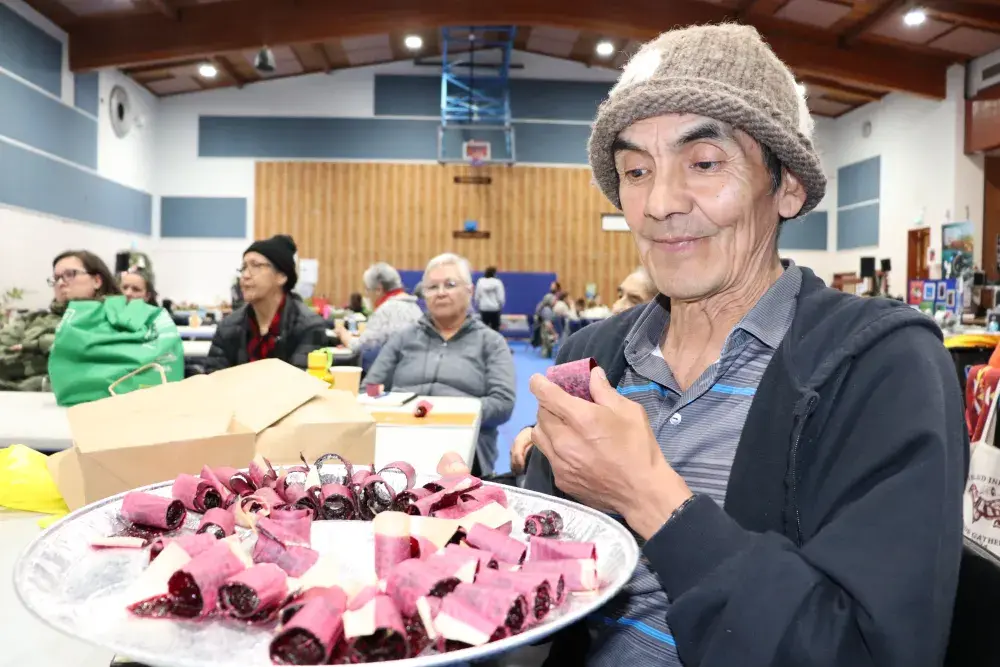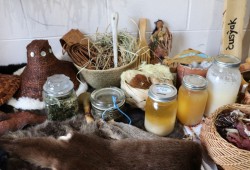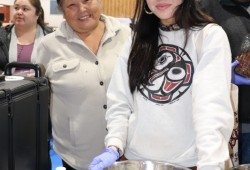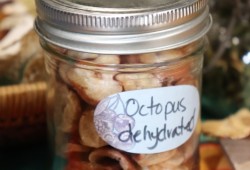First Nations people from all over the province arrived at the Tseshaht First Nation’s gym, Maht Mahs, on March 21 to share knowledge and celebrate Indigenous foods.
Hosted by Ahousaht First Nation, the gathering was held with the support of Tseshaht, who warmly welcomed people to their territory and assisted in feeding and caring for them over the two-day event.
“Ahousaht is proud to support the Island Indigenous Food Gathering,” said Ahousaht Chief Councillor n̓aasʔałuk, John Rampanen.
He went on to say that it is important to begin to address food security concerns after recent challenges Vancouver Islanders have faced.
“We have climate change, the heat dome, the Cameron Bluffs wildfire and COVID showing us how vulnerable we are with food security,” he added.
Events like the Island Indigenous Food Gathering allow people to draw from the strengths of their ancestors and do it in a modern context, Rampanen continued.
The event got off to a start at the Tseshaht longhouse, next door to Maht Mahs. With wood crackling in the fire pit, people were warmly welcomed to Tseshaht territory. Ahousaht elder Cliff Atleo Sr. told the people they would spend the next couple of days taking part in conversations about enhancing food availability and access.
The longhouse remained open for the entirety of the event as cultural helpers offered brushing, medicine consultations and other services.
Inside Maht Mahs and at other, smaller venues around the area guests were invited to participate in information and break-out sessions. In addition, there were guest speakers leading guided topics like emergency food planning, food security and sovereignty planning.
There were several food information tables lining the walls of Maht Mahs where resource people shared health information, or offered samples of home preserved foods, teas and medicines. In addition, guests were treated to traditional foods during the meal times – like smoked salmon, halibut, crab, herring and herring spawn.
During group discussions people shared ideas about food, nutrition and even attitudes about food. For example, a young woman recommended that mothers be encouraged to breastfeed their babies. This would mean working to change attitudes and end stigmatization around breastfeeding in public. There is scientific proof that breast milk and breastfeeding is far safer and nutritionally superior to bottle feeding infant formula.
Another idea shared was the re-establishment of food trade.
“We don’t have elk, but we have fish,” said Geneva Touchie, adding that no money is involved.
Over the two days people explored their own traditional foods and that of neighboring First Nations.
“This is very valuable to Nuu-chah-nulth for many reasons,” said Nuu-chah-nulth Tribal Council Vice-President Les Doiron. “It’s important to understand the power and authority over our traditional foods…foods our ancestors laid the groundwork for.”
“We need to get back to the old ways of eating…before contact we didn’t have the diseases we have today,” added Doiron.
Doiron pointed out that traditional diets are necessary for Nuu-chah-nulth-aht and stated that it’s important these foods are introduced in institutions like care homes and hospitals.
“It’s integral to our health and well-being,” he noted.
Traditional food is also important to citizens living in urban settings. Doiron pointed out that there is not enough space for everyone to live on reserve and they miss out on things like smoked fish, crab and sixmuu (herring spawn).
Island Indigenous Foods Gathering Coordinator Jacqueline Adams remained extremely busy during the event but took time to sit with Ha-Shilth-Sa for a quick minute. She said when she thinks about food security, it brings to mind the beginning of the pandemic and about intergenerational trauma.
“I watched our people rally to take care of each other...it was so moving when the Tla-o-qui-aht people delivered halibut to the Namgis (Alert Bay),” Adams reflected. “It is our way to take care of each other with food and it seems we’ve lost the ability to talk about it.”
According to studies after the 2023 Cameron Bluffs wildfire, which effectively cut off Port Alberni and communities to the west from food supply chains, in the event of an emergency Vancouver Island would have only three or four days of fresh food.
According to FED, a Victoria-based urban agriculture society, about 10 per cent of Vancouver Island’s food supply was grown locally in 2019.
“Up until the 1950s, 85 per cent of our food supply was grown locally here on the island,” they wrote.
Since 2019 some Island communities have planted community gardens to support local food sustainability.
The United Way is one of the major sponsors of the Island Indigenous Foods Gathering 2024. Spokesperson Julie Rushton was grateful to be part of the event. She said that food and diets for Indigenous people have been deconstructed by colonialism over time.
“That is why this is so important to the United Way, to hear about needs in the community will help us, in turn, to support the community,” she said.
Rampanen says he believes that there will be more Island Indigenous Foods Gatherings in the future and other similar events, because there is a hunger for such information sharing.
“I think there will be more,” he said.




